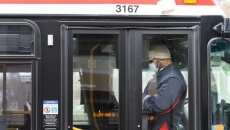VANCOUVER - Decriminalization of people with small amounts of illegal drugs for their own use has become a reality in British Columbia, but substance users and researchers say the change is expected to make little immediate difference because of a toxic drug supply.
The policy shift began Tuesday as the B.C. Coroners Service announced that suspected drug toxicity claimed 2,272 lives in 2022, the second highest in the province over a calendar year, trailing 2021 when 2,306 fatalities were recorded. An average of six people died every day last year.
Health Canada approved B.C.'s application for decriminalization through an exemption from federal drug laws so people 18 and over could carry up to 2.5 grams of opioids such as heroin and fentanyl, as well as crack and powdered cocaine, methamphetamine and MDMA. Users will not be arrested or have their drugs seized by police in what is a three-year pilot project.
Dean Wilson, who started working as a peer facilitator at the B.C. Centre on Substance Use in 2017 as a heroin user, said decriminalization is a welcome change to prevent drug users' interactions with police.
However, he said it needs to be accompanied with a bold plan to provide more people with a broad range of safer alternatives to toxic street drugs, which profiteers often cut or contaminate with the powerful opioid fentanyl.
"They'll cut their cocaine for five minutes, then they'll cut their fentanyl on the same scale and all of a sudden there's fentanyl on the cocaine. And when somebody who's never done opioids at all gets the one (hit) that had a little bit of fentanyl, they're dead," Wilson said.
A regulated supply of pharmaceutical alternatives should be available through multiple routes, including compassion clubs, to save the lives of people at risk of fatally overdosing, he said.
"There's nothing out there that's safe unless you test your dope every time. And you can't do that if you're an active addict."
Insite, a supervised consumption site that opened in Vancouver in 2003 as North America's first such facility, is among the few places to have a specialized machine that drug users can access to get their substances analyzed for contaminants including fentanyl.
Take-home fentanyl test strips are also available there and at designated sites to allow people to test their drugs within seconds.
Despite such services, over 11,000 peoplehave fatally overdosed in B.C. since 2016, when the province declared a public health emergency.
Those deaths led to the policy to stop criminalizing people who use drugs as a way to reduce stigma so they're more likely to get help for an addiction.
"If people think there's some kind of correlation between the decriminalization of drugs and the decrease of overdoses resulting in deaths, that is not gonna happen," said 64-year-old Wilson, who has been on a methadone treatment program since last May to help reduce his cravings for opioids, which he said he began using at age 13.
Researchers and people who use drugs say the 2.5-gram threshold is too low for those who may be forced to have more contact with sellers on the black market as they try to avoid interactions with police. The province requested the limit be 4.5 grams, while police called for a total of one gram for all the drugs allowed under the exemption.
They say decriminalization requires adequate supports so people get the help they need when they ask for it.
In Portugal, for example, decriminalization includes various harm-reduction and social services as well as treatment.
B.C.'s Mental Health and Addictions Minister Jennifer Whiteside said the province has expanded harm-reduction programs and since 2017, more than 360 new treatment and recovery beds have been opened. A prescription-based safer supply program was beefed up in July 2020, making B.C. "the first province to do so in Canada," she added.
More than two-thirds of officers with the RCMP and municipal departments in B.C. have so far taken training on aspects of decriminalization, which involves handing out so-called resource cards to people who use drugs, Whiteside told a news conference Monday.
They include information on contacting new "substance-use navigators" hired by health authorities specifically to build connections with local service providers and connect people referred by police, Whiteside said.
"Decriminalization is a historic change, but we know it will not solve the toxic drug crisis on its own."
Mike Serr, co-chair of the Canadian Association of Chiefs of Police, said while the group has long advocated for decriminalization, he is concerned that getting more services to people in areas such as northern B.C. will be a "challenge."
"These are things that I'm going to be watching and this is something that the government is going to have to address. That's a very key, critical part of this," said Serr, who is also deputy chief of the police department in Abbotsford, B.C.
Federal Mental Health and Addictions Minister Carolyn Bennett said the plan is to move people away from the criminal justice system to health and social services so such programs will need to be ramped up.
As for safer alternatives, some doctors are still uncomfortable about prescribing them despite guidelines from the College of Physicians and Surgeons of B.C., and its counterpart in Ontario, Bennett told The Canadian Press.
"We were very worried that some of the doctors who are prescribing were being reported to the college by some of their colleagues," she said.
"I am worried about the number of deaths that are from people in the construction, trades or natural resources (sectors). Or even at parties, the fact that somebody can die for having used once. We are going to have to really explore the options and I think that we've been persuaded that just the prescriber model will not stop this tragedy."
Bennett noted that one project in Vancouver, where a small number of drug users are prescribed powdered fentanyl, could be promising as part of an increased, regulated supply for more people.
Decriminalization will be monitored and evaluated, and some changes may be made based on the evidence that emerges during the pilot, Bennett said.
"The evidence we had was that most of the confiscations were well under 2.5 (grams) and so we will continue to monitor this, but we are prepared to adjust in any way to be able to fulfil our promise that this project will remain in the public interest."
Kora DeBeck, a research scientist at the B.C. Centre on Substance Use, said although the cumulative 2.5 grams is low, the fact that substances up to that amount will no longer be seized is a positive step for those who may otherwise borrow drugs or money and put themselves at risk of violence or even endure painful withdrawal symptoms.
"I would describe decriminalization of drug possession as an incredibly progressive, important move and a recognition that criminalization is harmful," she said. "It's responding to what I see as decades of research that shows that prohibition has been a failure and a disaster."
However, the poisoned drug supply is the major problem leading to overdose deaths, said DeBeck, who is also an associate professor in the school of public policy at Simon Fraser University.
"I think it's incredibly dangerous, actually, to think that (decriminalization) will have an impact on overdoses in the immediate term."
By the numbers for B.C.'s overdose crisis:
VICTORIA - British Columbia's chief coroner released overdose figures for 2022, showing 2,272 residents died from toxic drugs last year. Lisa Lapointe says drug toxicity remains the leading cause of unnatural death in B.C., and is second only to cancers in terms of years of life lost.
Here are some of the numbers connected to the overdose crisis:
189: Average number of deaths per month last year.
6.2: Average deaths per day.
At least 11,171: Deaths attributed to drug toxicity since the public health emergency was declared in April 2016.
70: Percentage of the dead between 30 and 59 years old.
79: Percentage of those who died who were male.
65: Children and youth who have died in the last two years.
82: Percentage of the deaths where the toxic opioid fentanyl was involved.
73,000: People in B.C. who have been diagnosed with opioid use disorder.
8.8: The rate that First Nations women are dying, as a multiple of the general population's rate.






